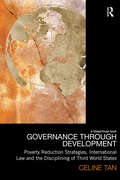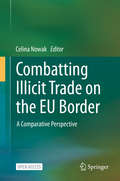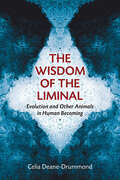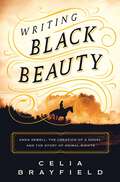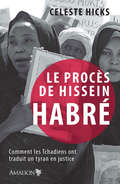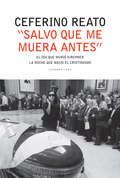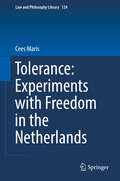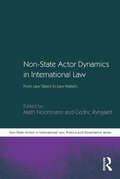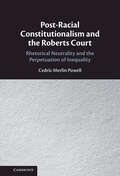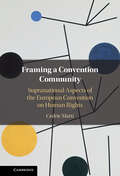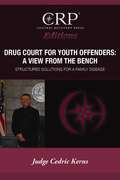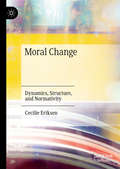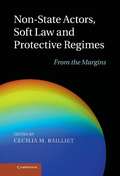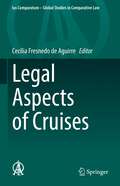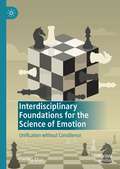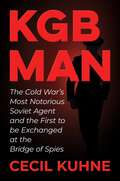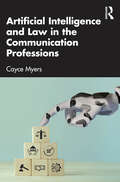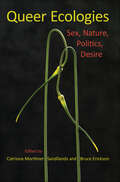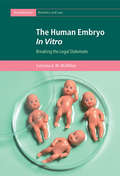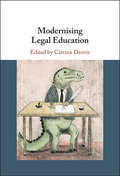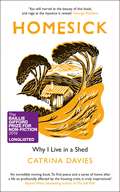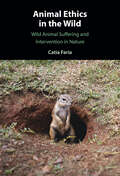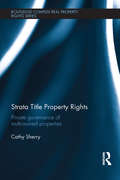- Table View
- List View
Governance through Development: Poverty Reduction Strategies, International Law and the Disciplining of Third World States (Law, Development and Globalization)
by Celine TanGovernance through Development locates the Poverty Reduction Strategy Paper (PRSP) framework within the broader context of international law and global governance, exploring its impact on third world state engagement with the global political economy and the international regulatory norms and institutions which support it. The PRSP framework has replaced the controversial structural adjustment programmes, as the primary mechanism through which official development financing is channelled to low-income developing countries. It has changed the regulatory landscape of international development financing, signalling a wider paradigmatic shift in the cartography of aid and, consequently, in the nature of north-south relations. Governance through Development documents and analyses this change within the legacy of postcolonial economic relations, revealing the wider legal, economic and geo-political significance of the PRSP framework. Celine Tan argues that the PRSP framework establishes a new regulatory regime that builds upon the disciplinary project of structural adjustment by embedding neoliberal economic conditionalities within a regime of domestic governance and public policy reform. The book will be of interest to scholars, researchers and students of law, political science and international relations, sociology and development studies.
Combatting Illicit Trade on the EU Border: A Comparative Perspective
by Celina NowakThis open access book provides the first-ever comparative study on criminal policy concerning the illicit trade of tobacco, conducted among four comparatively new EU Member States (Lithuania, Poland, Slovakia and Romania) and two “old” EU countries (Germany and Italy). The book addresses the national legal frameworks, current criminological situation regarding illicit trade of tobacco, and the practical challenges faced by national law enforcement authorities in the countries examined. It also considers the international framework, and concludes with a horizontal report. The objective of the book is to highlight legislative and practical challenges in the fight against illegal tobacco products at the national and transnational level, and to formulate recommendations for overcoming them more effectively in Europe.
The Wisdom of the Liminal: Evolution and Other Animals in Human Becoming
by Celia Deane-DrummondA sophisticated theological anthropology that takes into account evolutionary theories and our relationships to other animals In this book Celia Deane-Drummond charts a new direction for theological anthropology in light of what is now known about the evolutionary trajectories of humans and other animals. She presents a case for human beings becoming fully themselves through their encounter with God, after the pattern of Christ, but also through their relationships with each other and with other animals. Drawing on classical sources, particularly the work of Thomas Aquinas, Deane-Drummond explores various facets of humans and other animals in terms of reason, freedom, language, and community. In probing and questioning how human distinctiveness has been defined using philosophical tools, she engages with a range of scientific disciplines, including evolutionary biology, biological anthropology, animal behavior, ethology, and cognitive psychology. The result is a novel, deeply nuanced interpretation of what it means to be distinctively human in the image of God.
Writing Black Beauty: Anna Sewell, the Creation of a Novel, and the Story of Animal Rights
by Celia BrayfieldThe story of a remarkable woman who wrote a novel that not only became a classic, but also changed the way human society views and treats animals. Born in 1829 to a young Quaker couple, Anna Sewell grew up in poverty in London. She was fourteen when she fell and injured her ankle, which left her permanently disabled. Rejecting the life of a Victorian invalid, she developed an extraordinary empathy with horses, learning to ride side-saddle and to drive a small carriage. Rebellious and independent-minded, Anna suffered periods of severe depression as a young woman. She left the Quaker movement, but remained close friends with the women writers and abolitionists who had been empowered by its liberal principles. It was not until she became terminally ill, aged 51, that she found the courage to write her own book. Tragically, she died just five months after the book was published in 1877. Black Beauty is now recognised as the first anthropomorphic novel, and it had an extraordinary emotional impact on readers of all ages. After modest success in Britain, it was taken up by a charismatic American, George Thorndike Angell, a campaigner against animal cruelty who made it one of the bestselling novels of all time. Using newly discovered archive material, Celia Brayfield shows Anna Sewell developing the extraordinary resilience to overcome her disability, rouse the conscience of Victorian Britain and make her mark upon the world.
Le procès de Hissein Habré: Comment les Tchadiens ont traduit un tyrant en justice
by Celeste HicksLa condamnation de Hissein Habré pour crimes contre l'humanité a été décrite comme "un tournant pour la justice des droits humains en Afrique et au-delà". Pour la première fois, un criminel de guerre africain était condamné sur le sol africain. Pour avoir, dès le début, suivi le procès et interrogé de nombreuses personnes impliquées, la journaliste Celeste Hicks raconte la remarquable histoire de la manière dont Habré a été traduit en justice. Sa condamnation fait suite à une campagne héroïque de 25 ans menée par des militants et des survivants des atrocités de Habré qui a abouti, malgré l'indifférence internationale, l'opposition des alliés de Habré et plusieurs tentatives infructueuses de le traduire en justice en Europe et ailleurs. Face à de telles difficultés, la condamnation d'un dirigeant, autrefois intouchable, représente un tournant majeur, et a de profondes implications pour la justice africaine et l'avenir de l'activisme pour les droits humains dans le monde.
"Salvo que me muera antes": El día en que murió Kirchner. La noche que nació el cristinismo
by Ceferino Reato«Muchachos, el próximo presidente voy a ser yo salvo que me muera antes.» Néstor Kirchner a un grupo de dirigentes oficialistas y encuestadores. Residencia de Olivos, dos semanas antes de su muerte. A siete años de aquel miércoles 27 de octubre de 2010, la Argentina sigue sin saber con certeza dónde, a qué hora y de qué murió Néstor Kirchner; tampoco, si se podría haber salvado. Con un estilo que ya es marca -información original y precisa en una narración atrapante-, Ceferino Reato cuenta qué pasó exactamente ese día en El Calafate, explica cómo se reconfiguró el poder político en el país a partir de esa noche y da respuesta a las preguntas pendientes: *¿Cómo se llevaban realmente, puertas adentro, Néstor y Cristina? *¿Cuánto sabía ella del esquema de corrupción organizado por él? *¿Qué pasó en la despedida íntima antes del traslado del cuerpo a Buenos Aires? *¿Por qué el velatorio público se hizo a cajón cerrado? Por primera vez, la trama completa de la tragedia que dio origen al poderoso liderazgo de Cristina Fernández.
Tolerance: Experiments with Freedom in the Netherlands (Law and Philosophy Library #124)
by Cees MarisThis book presents a collection of philosophical essays on freedom and tolerance in the Netherlands. It explores liberal freedom and its limits in areas such as freedom of speech, public reason, sexual morality, euthanasia, drugs policy, and minority rights. The book takes Dutch practices as exemplary test cases for the principled discussions on these subjects from the perspective of political liberalism. Indeed, the Netherlands may be viewed as a social laboratory in human tolerance. During the Cultural Revolution of the 1960s, Holland took the lead in a global emancipation process towards a society based on equal freedom. It was the first country to legalize euthanasia, soft drugs and gay marriage. In the final sections, the book examines the question of whether the political murders on the politician Pim Fortuyn and the film director Theo van Gogh, the reactions to Ayaan Hirsi Ali’s film Submission, as well as the success of the populist politician Geert Wilders are signs of the end of Dutch tolerance. Although it recognizes that the political climate has taken a conservative turn, the book shows that the Netherlands still shows remarkable tolerance.
Non-State Actor Dynamics in International Law: From Law-Takers to Law-Makers (Non-State Actors in International Law, Politics and Governance Series)
by Cedric RyngaertNon-state actors have always been treated with ambivalence in the works of international law. While their empirical existence is widely acknowledged and their impact and influence uncontested, non-state actors are still not in the centre of international legal research. The idea that non-state actors are not law-makers, however, stands in sharp contrast with the growing notion of non-state actors as law-takers. This book examines the position of non-state actors in international law as law-makers and law-takers and questions whether these different positions can or should be separated from each other. Each contribution reveals both the political and normative aspects of the question as well as the positivistic possibilities and constraints to accommodate non-state actors as law-takers and law-makers in the contemporary international legal system. Altogether, each expert reveals that the position of non-state actors in international law is not a fixed one but changes with the functional and theoretical perspectives of the observer. Non-State Actor Dynamics in International Law is a welcomed addition to an under researched field of legal study. An indispensable read to scholars and policy makers wishing to gain new insights into general discourse on non-state actors in international law and the process of norm formation in the international realm.
Post-Racial Constitutionalism and the Roberts Court: Rhetorical Neutrality and the Perpetuation of Inequality
by Cedric Merlin PowellPost-Racial Constitutionalism and the Roberts Court: Rhetorical Neutrality and the Perpetuation of Inequality provides the first comprehensive Critical Race Theory critique of the United States Supreme Court under Chief Justice John Roberts. Since being named to the Court in 2005, Chief Justice Roberts has maintained a position of neutrality in his opinions on race. By dissecting neutrality and how it functions as a unifying feature in all the Court's race jurisprudence, this book illustrates the consequences of this ostensible impartiality. By examining the Court's racial jurisprudence dating back to the Reconstruction, the book shows how the Court has actively rationalized systemic oppression through neutral rhetoric and the elevation of process-based decisional values, which are rooted in democratic myths of inclusivity and openness. Timely and trenchant, the book illustrates the permanence of racism and how neutrality must be rejected to achieve true empowerment and substantive equality.
Framing a Convention Community: Supranational Aspects of the European Convention on Human Rights
by Cedric MartiThe European Convention on Human Rights (ECHR) has evolved from an international agreement into a highly integrated legal community with an ever more pervasive effect on domestic law and individuals. The supranational authority of the European Court of Human Rights bypasses the nation state in a growing number of other areas. Understanding the evolution of the ECHR and its Court may help in explaining and contextualising growing resistance against the Court, and in developing possible responses. Examining the Convention system through the prism of supranationality, Cedric Marti offers a fresh, comprehensive and interdisciplinary perspective on the expanding adjudicatory powers of the Court, including law-making. Marti addresses the growing literature of institutional studies on human rights enforcement to ascertain the particularities of the ECHR and its relationship to domestic legal systems. This study will be of great value to both scholars of international law and human rights practitioners.
Drug Court for Young Offenders: A View from the Bench
by Cedric KernsWhat makes drug court programs different from traditional criminal courts? This e-book answers that question and details the model of Youth Offender (YO) Court, a unique family-focused drug court program designed to address the specific needs of young persons, ages 18 to 24, and their families-from the perspective of the presiding judge.
Moral Change: Dynamics, Structure, and Normativity
by Cecilie EriksenHow does moral change happen? What leads to the overthrow or gradual transformation of moral beliefs, ideals, and values? Change is one of the most striking features of morality, yet it is poorly understood. In this book, Cecilie Eriksen provides an illuminating map of the dynamics, structure, and normativity of moral change. Through eight narratives inspired by the legal domain and in dialogue with modern moral philosophy, Eriksen discusses moral bias, conflict, progress, and revolutions. She develops a context-sensitive understanding of ethics and shows how we can harvest a knowledge of the past that will enable us to build a better future.
Non-State Actors, Soft Law and Protective Regimes: From the Margins
by Cecilia M. BaillietBy offering critical perspectives of normative developments within international law, this volume of essays unites academics from various disciplines to address concerns regarding the interpretation and application of international law in context. The authors present common challenges within international criminal law, human rights, environmental law and trade law, and point to unintended risks and consequences, in particular for vulnerable interests such as women and the environment. Omissions within normative or institutional frameworks are highlighted and the importance of addressing accountability of state and non-state actors for violations or regressions of minimum protection guarantees is underscored. Overall, it advocates harmonisation over fragmentation, pursuant to the aspiration of asserting the interests of our collective humanity without necessarily advocating an international constitutional order.
Legal Aspects of Cruises (Ius Comparatum - Global Studies in Comparative Law #56)
by Cecilia Fresnedo de AguirreThis book presents a comparative study on various issues regarding legal aspects of cruises – mainly, the importance of the cruise business, the impact of cruise tourism, general and specific rules applicable to cruises, liability issues, cruise passengers as consumers, package travel, labor rules for cruise workers, relevant rules on ports (e.g. on taxes, costs and rates charged to cruises in different ports), rules on the environmental impact of cruises, jurisdiction, arbitration, and choice of law in cruise contracts, and general conditions used by companies offering cruise services – in order to identify the current sources of law on these matters and determine whether or not they are appropriate and sufficient. Combining a general report with individual national reports, the book offers not only a general overview, but also the perspectives of selected jurisdictions in the Americas, Europe and Asia, namely: Argentina, Belgium, Bulgaria, Germany, Japan, Poland, Romania, Spain, Turkey, the United States, and Uruguay.
Interdisciplinary Foundations for the Science of Emotion: Unification without Consilience
by Cecilea MunIn this book, Cecilea Mun introduces an innovative meta-framework for conducting interdisciplinary research in the science of emotion, broadly construed, as well as a framework for a particular kind of theory of emotion. She provides new solutions and arguments in support of an embodied cognitive approach to resolving a wide range of problems, including those concerning skepticism, the place of ordinary intuitions for the science of emotion, intentionality, the rationality of emotions, naturalizing knowledge, and the debate between philosophical cognitive and noncognitive theories of emotion. Her solutions include a revolutionary, unifying, interdisciplinary taxonomy of theories of emotion, which allows one to understand the discourse in the science of emotion as a debate between four fundamental types of theories: realism, instrumentalism, eliminativism, and eliminative-realism. Her original proposal for a conception of intentionality that makes sense of our ordinary intuitions is also combined with her comprehensive account of rationality to articulate a groundbreaking understanding of the structure of human rationality. All of the contributions made herein, together, provide the foundations for a profound understanding of emotions, including as a kind of embodied language.
KGB Man: The Cold War's Most Notorious Soviet Agent and the First to be Exchanged at the Bridge of Spies
by Cecil KuhneA thin, balding, and reclusive middle-aged Russian by the name of Rudolf Ivanovich Abel was one of the Soviet Union&’s most renowned spies during the Cold War of the 1950s…until his cover was blown by an incompetent colleague who wanted to defect to the United States. This is the full account of Abel&’s espionage work, his dramatic apprehension, his eventual conviction and its affirmation by the United States Supreme Court, and finally, his surprising release back to Russia.Rudolf Ivanovich Abel ran KGB operations in the United States for nine years during the Cold War of the 1950s, until one day his true identity was revealed by a lazy, hard-drinking, womanizing colleague who decided to defect to the United States before he was sent back to Russia—and presumably his death—for incompetence in the field. As the authorities hunted down Abel, the FBI had in hand his tools of trade—hollowed-out bolts and coins used to send tiny coded messages and photographs back and forth to the Soviet Union—but little else in the way of hard leads. After Abel was located, his modest hotel in Manhattan was staked out by the FBI for over a month before he was eventually arrested and tried for espionage. After his conviction, Abel appealed his case to the Second Court of Appeals, where he argued that the search and seizure of his hotel room was unconstitutional because they were made without a warrant. His conviction was affirmed, and the case proceeded to the Supreme Court, which was sharply divided. The cliffhanger facing Abel for the next several years was whether he would face the electric chair, remain in prison for the rest of his life, or be exchanged for an American spy held by the Russians. His fate remained in the balance.
Dodd-Frank Wall Street Reform and Consumer Protection Act: Law, Explanation and Analysis
by Cch IncorporatedDodd-Frank Wall Street Reform and Consumer Protection Act: Law, Explanation and Analysis provides comprehensive analysis of this sweeping new banking and securities legislation. Passed by the House of Representatives on June 30 and by the Senate on July 15, the Dodd-Frank Wall Street Reform and Consumer Protection Act was signed into law by the President on July 21,2010.
Artificial Intelligence and Law in the Communication Professions
by Cayce MyersThis book analyzes the current attempts to regulate artificial intelligence (AI) and its impact on the communication field.Examining existing and proposed laws, policies, and regulations of AI in the U.S. and the European Union, this book analyzes how the technological development of AI will be governed in the next decade and how this will impact the communication industry. Chapters explore the influence of laws on key communication issues including free speech, disinformation, intellectual property, privacy, and discrimination, as well as the AI industry’s approach to self-regulation. It shows how communication professionals such as public relations practitioners, advertisers, and journalists will be affected by generative AI content production and how communication will ultimately be shaped by the regulations and laws placed on AI.Providing readers with a working knowledge of the contemporary legal issues surrounding AI and communication, this book will be of interest to scholars and students in the fields of Media and Communication Law, Public Relations, Advertising, and Journalism.
Queer Ecologies: Sex, Nature, Politics, Desire
by Catriona Mortimer-Sandilands and Bruce EricksonTreating such issues as animal sex, species politics, environmental justice, lesbian space and "gay" ghettos, AIDS literatures, and queer nationalities, this lively collection asks important questions at the intersections of sexuality and environmental studies. Contributors from a wide range of disciplines present a focused engagement with the critical, philosophical, and political dimensions of sex and nature. These discussions are particularly relevant to current debates in many disciplines, including environmental studies, queer theory, critical race theory, philosophy, literary criticism, and politics. As a whole, Queer Ecologies stands as a powerful corrective to views that equate "natural" with "straight" while "queer" is held to be against nature.
The Human Embryo In Vitro: Breaking the Legal Stalemate (Cambridge Bioethics and Law)
by Catriona A. McMillanThe Human Embryo in vitro explores the ways in which UK law engages with embryonic processes under the Human Fertilisation and Embryology Act 1990 (as amended), the intellectual basis of which has not been reconsidered for almost thirty years. McMillan argues that in regulating 'the embryo' – that is, a processual liminal entity in itself - the law is regulating for uncertainty. This book offers a fuller understanding of how complex biological processes of development and growth can be better aligned with a legal framework that purports to pay respect to the embryo while also allowing its destruction. To do so it employs an anthropological concept, liminality, which is itself concerned with revealing the dynamics of process. The implications of this for contemporary regulation of artificial reproduction are fully explored, and recommendations are offered for international regimes on how they can better align biological reality with social policy and law.
Modernising Legal Education
by Catrina DenvirOver the last decade, cost pressures, technology, automation, globalisation, de-regulation, and changing client relationships have transformed the practice of law, but legal education has been slow to respond. Deciding what learning objectives a law degree ought to prioritise, and how to best strike the balance between vocational and academic training, are questions of growing importance for students, regulators, educators, and the legal profession. This collection provides a range of perspectives on the suite of skills required by the future lawyer and the various approaches to supporting their acquisition. Contributions report on a variety of curriculum initiatives, including role-play, gamification, virtual reality, project-based learning, design thinking, data analytics, clinical legal education, apprenticeships, experiential learning and regulatory reform, and in doing so, offer a vision of what modern legal education might look like.
Homesick: Why I Live in a Shed
by Catrina DaviesThe story of a personal housing crisis that led to a discovery of the true value of home.*LONGLISTED FOR THE BAILLIE GIFFORD PRIZE**'You will marvel at the beauty of this book, and rage at the injustice it reveals' George Monbiot**'Incredibly moving. To find peace and a sense of home after a life so profoundly affected by the housing crisis, is truly inspirational' Raynor Winn, author of The Salt Path*Aged thirty-one, Catrina Davies was renting a box-room in a house in Bristol, which she shared with four other adults and a child. Working several jobs and never knowing if she could make the rent, she felt like she was breaking apart. Homesick for the landscape of her childhood, in the far west of Cornwall, Catrina decides to give up the box-room and face her demons. As a child, she saw her family and their security torn apart; now, she resolves to make a tiny, dilapidated shed a home of her own.With the freedom to write, surf and make music, Catrina rebuilds the shed and, piece by piece, her own sense of self. On the border of civilisation and wilderness, between the woods and the sea, she discovers the true value of home, while trying to find her place in a fragile natural world.This is the story of a personal housing crisis and a country-wide one, grappling with class, economics, mental health and nature. It shows how housing can trap us or set us free, and what it means to feel at home.
Homesick: Why I Live in a Shed
by Catrina DaviesThe story of a personal housing crisis that led to a discovery of the true value of home.*'You will marvel at the beauty of this book, and rage at the injustice it reveals' George Monbiot**'Incredibly moving. To find peace and a sense of home after a life so profoundly affected by the housing crisis, is truly inspirational' Raynor Winn, bestselling author of The Salt Path*Aged thirty-one, Catrina Davies was renting a box-room in a house in Bristol, which she shared with four other adults and a child. Working several jobs and never knowing if she could make the rent, she felt like she was breaking apart. Homesick for the landscape of her childhood, in the far west of Cornwall, Catrina decides to give up the box-room and face her demons. As a child, she saw her family and their security torn apart; now, she resolves to make a tiny, dilapidated shed a home of her own.With the freedom to write, surf and make music, Catrina rebuilds the shed and, piece by piece, her own sense of self. On the border of civilisation and wilderness, between the woods and the sea, she discovers the true value of home, while trying to find her place in a fragile natural world.This is the story of a personal housing crisis and a country-wide one, grappling with class, economics, mental health and nature. It shows how housing can trap us or set us free, and what it means to feel at home.This audio edition includes music by Catrina Davies.(P)2019 Quercus Editions Limited
Animal Ethics in the Wild: Wild Animal Suffering and Intervention in Nature
by Catia FariaAnimals, like humans, suffer and die from natural causes. This is particularly true of animals living in the wild, given their high exposure to, and low capacity to cope with, harmful natural processes. Most wild animals likely have short lives, full of suffering, usually ending in terrible deaths. This book argues that on the assumption that we have reasons to assist others in need, we should intervene in nature to prevent or reduce the harms wild animals suffer, provided that it is feasible and that the expected result is positive overall. It is of the utmost importance that academics from different disciplines as well as animal advocates begin to confront this issue. The more people are concerned with wild animal suffering, the more probable it is that safe and effective solutions to the plight of wild animals will be implemented in the future.
Strata Title Property Rights: Private governance of multi-owned properties (Routledge Complex Real Property Rights Series)
by Cathy SherryMulti-owned properties make up an ever-increasing proportion of commercial, tourist and residential development, in both urban and rural landscapes around the world. This book critically analyses the legal, social and economic complexities of strata or community title schemes. At a time when countries such as Australia and the United States turn ever larger areas into strata title/condominiums and community title/homeowner associations, this book shows how governments, the judiciary and citizens need to better understand the ramifications of these private communities. Whilst most strata title analysis has been technical, focusing on specific sections of legislation, this book provides higher level analysis, discussing the wider economic, social and political implications of Australia’s strata and community title law. In particular, the book argues that private by-laws, however desirable to initial parties, are often economically inefficient and socially regressive when enforced against an ever-changing group of owners. The book will be of particular interest to scholars and legal practitioners of property law in Australia, but as the Australian strata title model has formed the basis for legislation in many countries, the book draws out lessons and analysis that will be of use to those studying privately-owned communities across the world.
